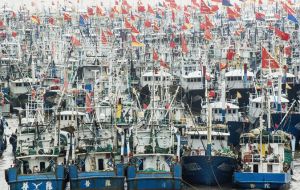MercoPress. South Atlantic News Agency
A third of fish catches in worlds' oceans is unreported, claims Canadian report
 Zeller pointed out that the team was able to uncover the unreported fishing activity by restructuring the official data provided by the UN with external data
Zeller pointed out that the team was able to uncover the unreported fishing activity by restructuring the official data provided by the UN with external data ![“Catches around the world peaked around the mid-1990s — [and] that's been declining steadily by about 1 to 1.2 million tons per year ever since”](/data/cache/noticias/59367/300x190/1-ilegal-fishing.jpg) “Catches around the world peaked around the mid-1990s — [and] that's been declining steadily by about 1 to 1.2 million tons per year ever since”
“Catches around the world peaked around the mid-1990s — [and] that's been declining steadily by about 1 to 1.2 million tons per year ever since”  The scientists explained that many fish stocks are on the brink of collapse and that bringing them back to healthy levels is not easy.
The scientists explained that many fish stocks are on the brink of collapse and that bringing them back to healthy levels is not easy. A scientific research from the University of British Columbia (UBC)’s “The Sea Around Us Project”, indicates that nearly a third of fish caught in the world's oceans goes unreported. The scientists carrying out the analysis found that while as much as 120 million tons were fished from the oceans in 2015, the United Nations’ official capture reports revealed that in 81.2 million tons were harvested from the ocean, CBC reported.
“Fifty per cent more fish were actually taken out, were caught by fisheries around the world, than the officially reported data that countries provide actually would suggest,” said Dirk Zeller, a senior scientist and executive director for the Sea Around Us project at UBC.
Zeller pointed out that the team was able to uncover the unreported fishing activity by restructuring the official data provided by the UN with external data, such as university studies, nutritional surveys, and local knowledge.
It took 10 years for these scientists to piece the data together but Zeller said it has given them a greater sense of the immense pressure commercial fishing has put on fish populations.
“Catches around the world peaked around the mid-1990s — [and] that's been declining steadily by about 1 to 1.2 million tons per year ever since” he said, adding that the number of boats and fishermen on the water have increased in the same time period and implying that more and more fisherman, catching less and less and less — that is a sign of overfishing.
The scientists explained that many fish stocks are on the brink of collapse and that bringing them back to healthy levels is not easy.
“If you take a fish population and you deplete it substantially to a very small percentage of its original version ... then you create a situation where these fish might not be able to recover — even if you stop harvesting it, purely because its place in the ecosystem might have changed,” highlighted Zeller.
The scientists and other members from The Sea Around Us team recently captured the global overfishing crisis in a new documentary, titled An Ocean Mystery: The Missing Catch. The documentary shows that the devastation of fish stocks is on full display, especially in the case of juvenile specimens. (FIS)




Top Comments
Disclaimer & comment rulesCommenting for this story is now closed.
If you have a Facebook account, become a fan and comment on our Facebook Page!